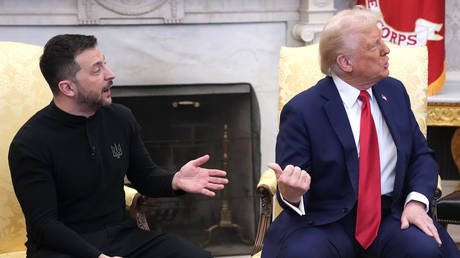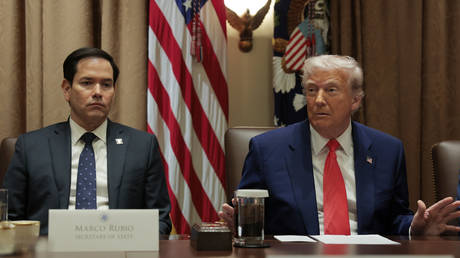Shifting dynamics within the GOP have brought to light a heated debate on U.S. foreign policy and Ukraine aid, as key members of the party clash over the appropriate approach to international relations. The GOP foreign policy has been a focal point of contention, with differing opinions on how the United States should engage with Ukraine and other global players. The debate has sparked intense discussions on the role of the U.S. in shaping international affairs, with some advocating for a more interventionist stance while others push for a more cautious approach. As the GOP grapples with these shifting dynamics, the future of U.S. foreign policy and its impact on Ukraine aid remains uncertain.
Amidst the evolving landscape of the GOP, there has been a notable shift in the party’s stance on U.S. foreign policy and the provision of aid to Ukraine. The ongoing debate within the GOP has brought to the forefront conflicting perspectives on how the United States should navigate its relationships with other countries, particularly in the context of the Ukraine aid package. This internal struggle has raised questions about the party’s approach to international diplomacy and its implications for global security. As the dynamics within the GOP continue to evolve, the debate on U.S. foreign policy and Ukraine aid remains a pivotal issue that will shape the party’s future direction.
Republican Party’s Division on U.S. Posture Abroad
There is a growing sense of division within the Republican Party regarding the U.S. posture abroad, particularly in countering Russia. The party’s stance on military aid to Ukraine reflects a fundamental break and a shift away from the long-held GOP neoconservative approach to foreign policy. This approach, which was heavily interventionist, has been a hallmark of Republican Party leaders from the 1980s through the early 2000s. However, there is now a resurgence of a different approach in the GOP, one that leans towards isolationism, a strategy not largely held since before World War II. This shift is evident in the rejection of traditional establishment neoconservative stances, favoring military intervention to promote democracy. Many Republicans, including Sen. JD Vance, are in agreement that this approach has not been a winning formula, especially in light of the decades-long wars in the Middle East.
Sen. JD Vance has been vocal about the stark divisions within the GOP when it comes to foreign policy. He has criticized Senate Minority Leader Mitch McConnell’s foreign policy positions, claiming that nearly every position he has held has been wrong. The push by some in the Republican Party to back off aid to Ukraine has revealed the extent to which Kyiv relies on the U.S. in its fight against Russia. While many in the GOP see Ukraine’s victory over Moscow as a vital security interest to the U.S., Vance and Trump believe it should also be Europe’s burden to shoulder. This has led to unease among NATO allies over the threat of discontinued aid to Ukraine under a Trump presidency, prompting speculation about the security of Europe and the alliance being in jeopardy.
Impact on NATO and U.S. Relations
The division within the Republican Party on the U.S. posture abroad has significant implications for NATO and U.S. relations with its European allies. While former President Trump led the push to get more NATO nations to meet their defense spending pledges, there is still a fundamental divide within the GOP when it comes to the U.S. and its relationship with NATO. Despite advances in international defense efforts, there is a concern that the scale of contributions from some NATO nations is not enough to significantly impact the alliance. This has led to calls for the big economies, such as Canada, to contribute more to defense spending, as their current contributions are not sufficient.
There is also concern that a potential shift in U.S. foreign policy towards isolationism could weaken the NATO alliance. While Sen. JD Vance has argued that America should focus on countering the threat posed by China, experts have cautioned that U.S.-China competition is not simply a regional competition but a global one. Maintaining European relations is seen as crucial to leveraging U.S. influence to address global challenges, including controlling advanced technologies and the military balance of power. The growing concern among Republicans about isolationism and its potential security threats has raised questions about the historical tendency to remain aloof from problems in other regions, particularly in Europe. The reluctance to involve itself in European affairs before World War II is cited as a cautionary example of the potential consequences of isolationism.
Shifting Dynamics within the GOP: The Debate on U.S. Foreign Policy and Ukraine Aid
| Topic | Description |
|---|---|
| Issue | The debate within the GOP on U.S. foreign policy and the provision of aid to Ukraine |
| Key Players | Republican lawmakers, administration officials, and foreign policy experts |
| Arguments | Some Republicans advocate for a strong stance on Ukraine and increased aid, while others emphasize a more cautious approach |
| Impact | The debate reflects shifting dynamics within the GOP and has implications for U.S. foreign policy and relations with Ukraine |
RESULT
The debate on U.S. foreign policy and Ukraine aid within the GOP highlights the complexities and diverging perspectives within the party. It underscores the ongoing evolution of Republican foreign policy and its implications for international relations.





